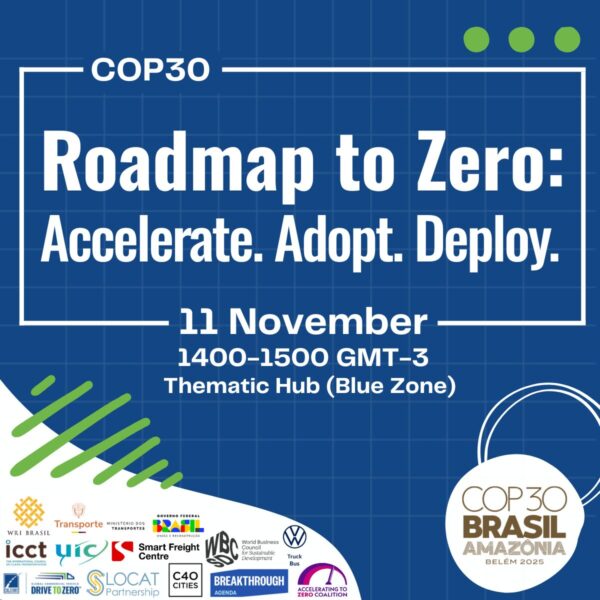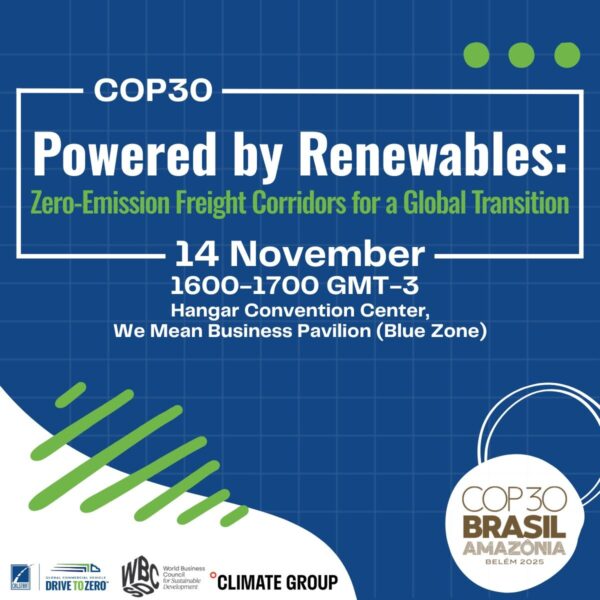Roadmap to Zero: Accelerate. Adopt. Deploy.
11 November 2025 at 14:00–15:00 GMT-3
Thematic Hub (Blue Zone)
 This high-level session highlights breakthrough solutions for zero-emission and intermodal transport, highlighting global efforts to accelerate decarbonization across road, rail and multimodal systems. The session will emphasize international collaboration, policy commitments, and innovative initiatives aligned with the vision of just, efficient and resilient transport. A major announcement will be made regarding Brazil’s first electric-truck corridor and the Low-Carbon Rail Challenge. There will also be deliberations on implementing outputs under the Plans to Accelerate Solutions on Accelerating Zero-and-Low Emission Technologies in Hard to Abate Sectors, the Road Transport Breakthrough along with actions outlined in the SLOCAT Manifesto for intermodal, low-carbon, efficient and resilient freight transport and logistics.
This high-level session highlights breakthrough solutions for zero-emission and intermodal transport, highlighting global efforts to accelerate decarbonization across road, rail and multimodal systems. The session will emphasize international collaboration, policy commitments, and innovative initiatives aligned with the vision of just, efficient and resilient transport. A major announcement will be made regarding Brazil’s first electric-truck corridor and the Low-Carbon Rail Challenge. There will also be deliberations on implementing outputs under the Plans to Accelerate Solutions on Accelerating Zero-and-Low Emission Technologies in Hard to Abate Sectors, the Road Transport Breakthrough along with actions outlined in the SLOCAT Manifesto for intermodal, low-carbon, efficient and resilient freight transport and logistics.
Featured Experts:
- Stephanie Kodish, Senior Global Director, CALSTART / Drive to Zero
- Dan Loschpe, COP 30 Climate High-Level Champion, Brazil
- Renan Filho, Minister of Transport, Federative Republic of Brazil
- Rachel Kyte, Special Representative for Climate, United Kingdom
- María Fernanda Rojas Mantilla, Minister of Transport, Republic of Colombia
- Alicia Bárcena, Secretary of Environment and Natural Resources, Mexico
- Stefanie Sohm, Advisor for Transport and Climate, Kühne Climate Center
- Roberto Cortes, President & CEO, Volkswagen Truck & Bus / TRATON GROUP
- Kara H. Hurst, Chief Sustainability Officer, Amazon
- Andressa Lemos, Marketing & Comms, LOTS Group
- Sophie Punte, Supervisory Board member, Founder, Smart Freight Centre
-
Bernard Peille, ALSTOM Managing Director for LATAM
Organizers: CALSTART / Drive to Zero, SLOCAT Partnership, Road Transport Breakthrough (Breakthrough Agenda), Accelerating to Zero Coalition, ICCT, UIC, Smart Freight Center (SFC), C40, Volkswagen Truck & Bus, WRI Brazil, WBCSD, and the Ministries of Transport of Colombia and Brazil
Accelerating Zero-Emission Trucking Between Rio de Janeiro and São Paulo: The Laneshift e-Dutra project presentation
This COP30 side session will offer Brazilian companies the opportunity to electrify their fleets, reduce emissions and improve resilience by joining the e-Dutra coalition and taking collective action. The Dutra corridor, connecting Rio de Janeiro and São Paulo, is a vital artery for commerce and logistics. The e-Dutra coalition aims to catalyze this transition by bringing together leading companies, infrastructure providers, and policymakers to enable at least 1,000 electric truck trips along the corridor by 2030. The session will demonstrate how coordinated efforts can make the business case for electric trucks and charging infrastructure competitive and help scale up zero-emission trucking, paving the way for a sustainable logistics future.
Organizers: Smart Freight Centre, CALSTART, C40 Cities, WBCSD, ICCT, WRI Brasil, CEBDS, SLOCAT
Powered by Renewables: Zero-Emission Freight Corridors for a Global Transition
14 November 1600-1700 GMT-3
Hangar Convention Center, We Mean Business Pavilion (blue zone) Auditorium
 Decarbonizing trucking and urban freight is essential to meeting national and global climate goals. Freight and urban delivery corridors—critical arteries of trade, logistics, and daily life—offer powerful opportunities to accelerate this transition by aligning infrastructure, finance, and policy along shared routes.
Decarbonizing trucking and urban freight is essential to meeting national and global climate goals. Freight and urban delivery corridors—critical arteries of trade, logistics, and daily life—offer powerful opportunities to accelerate this transition by aligning infrastructure, finance, and policy along shared routes.
The EV100+, the Global Green Road Corridors (GGRC) initiative and the Zero Emission Vehicle Emerging Markets Initiative (ZEV-EMI) bring together governments, industry leaders, and financiers from over ten countries to design and implement real-world zero-emission freight corridors, demonstrating how long-haul and urban transport can be powered by clean, renewable energy. These corridors serve as living laboratories for implementation, where clean energy, logistics planning, and public-private finance converge to reduce fossil fuel dependence, strengthen energy security, and unlock new economic opportunities. Together, these initiatives are turning ambition into action—linking urban and regional systems to make electric, renewable-powered transport the new normal by 2030.
This session will explore innovative finance and implementation models for zero-emission freight corridors and cities, including total cost of ownership (TCO) insights and blended-finance approaches. It will highlight progress from Mexico and discuss the potential to decarbonize Australia’s Hume Highway, a flagship opportunity to demonstrate scalable, renewable-powered freight and urban logistics transformation.
This event will feature announcements on:
- Mexico Collective action & investment partnership to scale light and heavy-duty vehicles on the northern Mexico corridor and in selected cities
- The Hume Highway, Australia’s first Global Green Road Corridor (GGRC), with early deployments planned for COP31 under the Sydney–Melbourne Powered by Renewables Truck Corridor
- How corridors leverage renewable energy, infrastructure, and policy alignment to accelerate zero-emission freight
Featured Experts:
-
Sita Holtslag, Europe Director, CALSTART / Drive to Zero
-
Alicia Bárcena, Secretary of Environment and Natural Resources (SEMARNAT), Mexico*
-
Nic Dorward, Director, Government Relations, Australian Renewable Energy Agency (ARENA)
-
Andreas Kammel, Vice President, Sustainability and Regulatory Affairs, TRATON GROUP
-
Rainer Knobloch, Co-Founder & Chief Strategy & Operating Officer, NewVolt
-
Concepción Boo Arias, Head of Global Partnerships & Enablement, Maersk
-
Simon Henzell-Thomas, Global Director, Climate & Nature, IKEA*
-
Diane Holdorf , Executive Vice President, World Business Council for Sustainable Development (WBCSD)
-
Sebastian Salter, Director, International Climate and Energy Division Department of Climate Change, Energy, the Environment and Water, Government of Australia
Organizers: CALSTART/Drive to Zero, the Climate Group, WBCSD
